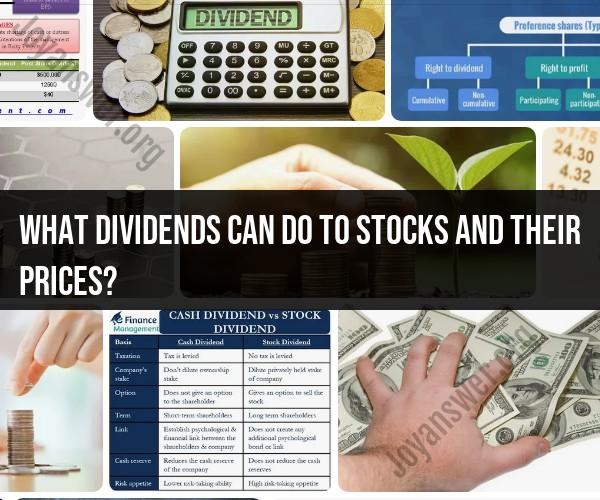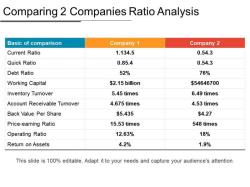What dividends can do to stocks and their prices?
Dividends can have several effects on stocks and their prices, influencing investor behavior and market dynamics. Here are the key ways dividends can impact stocks and their prices:
Income Stream for Investors:
- Dividends provide a regular income stream for investors who hold dividend-paying stocks. This can be particularly attractive to income-oriented investors, such as retirees, seeking a steady cash flow from their investments.
Attracting Income Investors:
- Stocks that pay dividends are often more appealing to income-focused investors, which can lead to increased demand for these stocks. This increased demand can put upward pressure on their prices.
Dividend Yield and Valuation:
- Dividend yield, calculated as the annual dividend per share divided by the stock's price per share, is an important metric for evaluating the attractiveness of dividend-paying stocks. As dividend payments increase (or are expected to increase), the dividend yield rises, potentially making the stock more attractive to investors.
Supporting Stock Prices:
- Dividends can act as a support for stock prices, especially in turbulent markets. When a company consistently pays dividends, it signals financial stability and a commitment to returning value to shareholders. This can reassure investors and prevent excessive stock price declines.
Dividend Growth:
- Companies that regularly increase their dividend payments may be viewed favorably by investors. Dividend growth signals financial health and confidence in future earnings. Stocks of companies with a history of increasing dividends may see upward price momentum.
Income Replacement:
- For some investors, dividends can serve as a source of income that replaces the need to sell shares of stock. This can be advantageous during periods of market volatility or when investors want to avoid realizing capital gains.
Market Sentiment and Expectations:
- Dividend announcements and changes in dividend policies can affect market sentiment. A company that unexpectedly reduces or suspends its dividend may face negative investor sentiment, which can lead to a decline in its stock price.
Tax Considerations:
- In some jurisdictions, dividends may be taxed differently than capital gains. Investors may factor in tax implications when deciding between dividend-paying stocks and stocks that do not pay dividends.
Capital Allocation and Investment Strategy:
- For companies, decisions about whether to pay dividends or reinvest earnings into the business can impact their stock prices. Companies that choose to pay dividends may attract certain types of investors, while those that reinvest earnings may appeal to growth-oriented investors.
Sector and Industry Differences:
- Dividend practices can vary by sector and industry. For example, mature and established companies in sectors like utilities and consumer staples are more likely to pay consistent dividends, while newer technology companies may prioritize reinvestment for growth over dividends.
It's important to note that the impact of dividends on stock prices is not uniform across all stocks. The effect depends on various factors, including the company's financial health, dividend policy, market conditions, and investor preferences. Additionally, some investors may prefer non-dividend-paying stocks if they believe in the potential for capital appreciation and are willing to forgo regular income in pursuit of long-term growth. Ultimately, the decision to invest in dividend-paying stocks or non-dividend-paying stocks should align with an investor's financial goals and risk tolerance.
Dividends and Stock Prices: A Comprehensive Analysis
Dividends are payments made by a company to its shareholders out of its profits. Dividends can be paid in cash, stock, or other assets. Stock prices are the prices at which shares of a company's stock are traded on the stock market.
Dividends and stock prices have a complex relationship. On the one hand, dividends can reduce the value of a company's stock because they represent a cash outflow from the company. On the other hand, dividends can also signal that a company is profitable and well-managed, which can lead to higher stock prices.
The Dynamic Relationship Between Dividends and Stock Values
The relationship between dividends and stock prices can vary depending on a number of factors, including:
- The company's financial performance: Companies that are profitable and have strong cash flow are more likely to pay dividends. Investors are typically willing to pay a higher price for shares of companies that pay dividends, as they are seen as being more financially stable.
- The overall stock market: When the stock market is rising, investors are more likely to be willing to buy shares of companies, regardless of whether or not they pay dividends. However, when the stock market is falling, investors may be more likely to sell shares of companies that do not pay dividends, as they are seen as being less risky.
- The company's industry: Companies in some industries, such as utilities and consumer staples, are more likely to pay dividends than companies in other industries, such as technology and growth stocks. This is because companies in these industries typically have more stable cash flows.
Understanding the Interplay of Dividends and Stock Prices
Investors should carefully consider the relationship between dividends and stock prices when making investment decisions. Investors who are looking for income may want to invest in companies that pay dividends. However, investors who are looking for growth may want to invest in companies that do not pay dividends, as they can reinvest their earnings into the company, which can lead to higher stock prices in the long term.
It is also important to note that dividends are not guaranteed. Companies can reduce or eliminate their dividends at any time. Therefore, investors should not rely on dividends as their sole source of income.
Investors should work with a financial advisor to develop an investment strategy that meets their individual needs and goals.













